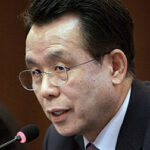By Han Seung Soo, Former Prime Minister of South Korea (2008-2009) and Vice President of Club de Madrid. Originally published in Brussels Morning.
After largely avoiding widespread COVID-19 infections in South Korea since the pandemic began, the country is now leading the world in new cases reported over the last week. South Korea is not alone. From Hong Kong to New Zealand, many countries that have managed to stem the tide of COVID-19 cases and deaths since 2020 are now experiencing unprecedented spikes.
The last few weeks have yet again served as a testament to the global nature of the pandemic – no country is safe until all countries are safe from the virus. While some countries are reinstating lockdowns, others are taking their foot off the pedal or simply learning to live with the virus. With a highly transmissible virus adept at crossing borders in our globalized world, this kind of piecemeal approach is not working. Even before the Omicron variant took hold around the world, the fragmented pandemic preparedness and response effort taken at the international level and by countries led to millions of preventable deaths and trillions of dollars lost.
More than ever, the world needs a new international system to encourage global solidarity in times of crisis and enable countries at every income level to detect, alert and respond to health threats before they become pandemics. While many countries find themselves in the middle of new COVID-19 outbreaks, the time is now to plan ahead and make sure the next response is cohesive, equitable and effective. We cannot continue the global cycle of crisis and complacency, especially when we have the tools to correct it.
In a new Call to Action supported by Club de Madrid, the Panel for a Global Public Health Convention has proposed a bold path forward to address gaps in the current order and dramatically strengthen pandemic prevention, preparedness and response systems through a new Pandemic Treaty or Convention. The new set of recommendations call for a positively incentivized system governed at the heads of state level where compliance with agreed preparedness standards, alert protocols and response efforts are overseen by an independent monitoring and assessment body at arm’s length to the World Health Organization (WHO).
While WHO’s leadership in setting international standards in preparedness and response and supporting countries achieve targets is vital and would need to be strengthened, an independent body would add an additional layer of accountability. With the mandate to call on and call out countries based on performance of pandemic preparedness, detection and response, an independent body could help avoid the ad hoc approach taken during COVID-19 by holding countries to account.
Establishing this accountability within countries and at the international level is essential to a Pandemic Treaty. In order to take decisive action during a crisis, who is required to take what action and when must be determined. This includes accountability for preparation; transparent and real-time reporting of health threats; implementation of evidence-based public health measures; information sharing, including of genetic sequences, specimens and samples; equitable distribution of pandemic goods; as well as a fully funded financing facility.
South Korea learned many of these lessons in the aftermath of the Middle East Respiratory Syndrome (MERS) outbreak in 2015. The Government took responsibility and action to bolster its pandemic preparedness and response efforts by investing in disease surveillance and reporting systems, building fit-for-purpose isolation units, increasing health worker training for crisis response and PPE use, as well as practicing outbreak simulation responses at the local-level to determine who does what when.
This kind of preparation is not free. Though trivial in comparison to the trillions of dollars that have been needed to contain COVID-19 and its economic consequences, it is estimated that billions of dollars will be needed to fund adequate preparedness measures in many low- and middle-income countries. That is why the Panel urges that a new Pandemic Treaty include a multilateral financing facility to ensure all countries can access predictable and sustainable funding without incurring catastrophic debt.
Finally, a Treaty must ensure that all tools and countermeasures to contain the outbreak, like PPE, tests and vaccines, must be considered global public goods and be financed, produced and distributed as such. The scramble for pandemic supplies such as vaccines continues to hold the entire world back from moving forward and has left large swaths of the world vulnerable to preventable deaths.
Rampant vaccine inequity and recent spikes in COVID-19 cases across the region should serve as a sobering reminder that our current system is not working. Through adherence to an accountable Pandemic Treaty, there is a chance to make this right and create a system capable of stopping outbreaks in their tracks and ensuring an equitable response if one is needed. Let’s take this opportunity to implement evidence-based solutions, learn from the last two years and build a healthier and safer world.
